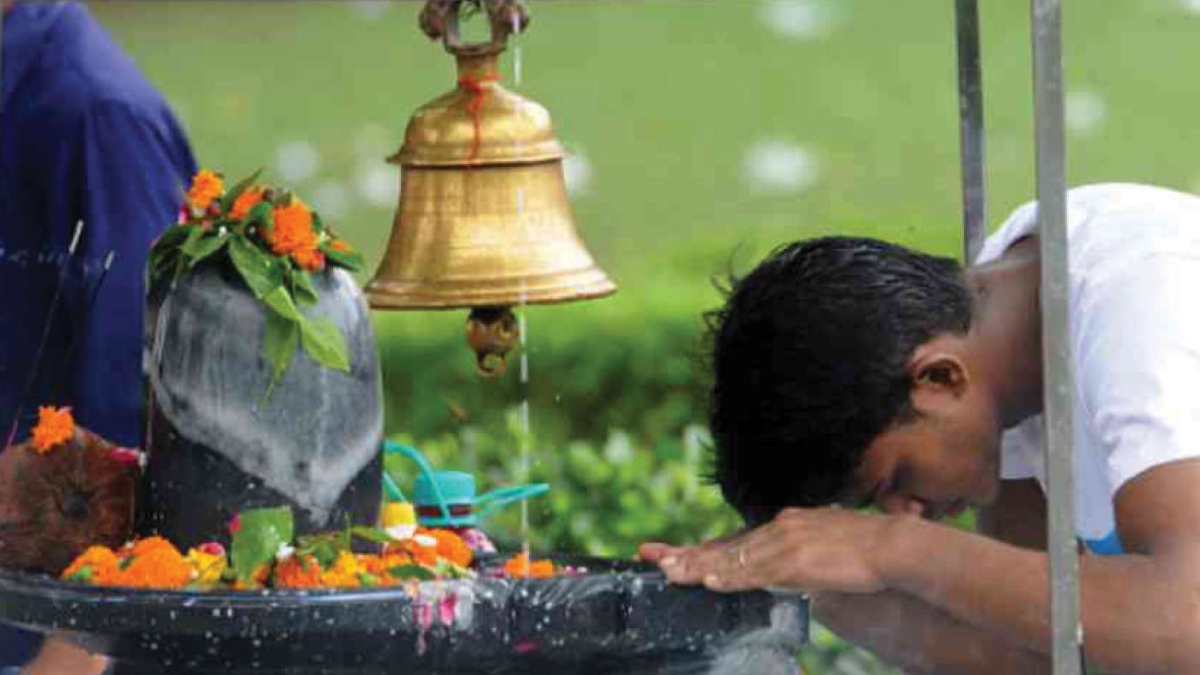


Shivratri is observed all over India. For those immersed in myriad thoughts of material life, holy days are occasions to remember God and to become more aware of the true goal of life. When hundreds of thousands of people remember the divine with a one-pointed focus, dedicate their actions to God, and worship God, then the very environment becomes pure. Thereafter, thinking of God becomes effortless for others, too.
One way in which Shivratri is different from other festivals that give importance to prayer and worship is that it emphasises self-sacrifice and austerity. It is also a day to remind ourselves of the goal of life and examine our spiritual progress. Currently, most of us give considerable importance to food and sleep. Shivratri teaches us to set such preferences and enshrine God in our heart. If we can dedicate at least one day a year to giving God foremost importance in our life—treating that as a sacred vow—the resulting samskara (impression)will make our lives more God-oriented.
Shivratri, which is celebrated at the end of winter, is a harbinger of spring. There is an inner meaning in this. When the light and warmth of knowledge thaw the mind benumbed by inertia and ignorance, the flowers of joy and peace begin to blossom. The change of seasons is characteristic of the outer world. However, if we try, we can control our inner weather and temperature—even making it unchanging. To do so, spiritual knowledge is required.
When we are steeped in pain and pleasure, we fail to think of God, the one who bestows everything upon us. When we experience creation, we fail to remember the Creator. While enjoying a sweet, we should be able to remember the person who made it. However, we primarily just enjoy the sweet. We are bewitched by maya—the superficial changing aspects of creation. As a result, we are unable to experience supreme bliss.
It is difficult for someone predominantly tamasic (dull) or rajasic (extroverted) to discover the divine principle hidden in creation. Such minds pursue creation as if it were an inexhaustible mine of material pleasure. On the contrary, the person who is predominantly sattvic (peaceful) turns God-ward. By observing the vows associated with Shivratri, we are able to foster such sattvic qualities.
Lord Shiva is Gangadhara—the one who holds the Ganges. He eternally holds Ganga, which is of the nature of immortality, on his head. Ganga is synonymous with gentle coolness. No matter how turbulent the situation, the Lord’s head and inner realm remain peaceful. Though his head is cool, his heart is always warm with compassion. In order to save the world from the all-destructive kalakuta poison, the Supreme Lord drank it. Through his example, Lord Shiva teaches us that what we need is a cool head and a warm heart. But what we see in the world today is the opposite: Most people are hot-headed and cold-hearted. Everyone’s head is heated up with worldly desires, and the heart has become frosty with selfishness. When our head is cool, we can face the most adverse circumstance peacefully and turn them to our advantage.
Not only on Shivratri, but on every day, let us remind ourselves, “I am not this limited, changing body. I am Shiva. My ultimate nature is the supreme consciousness.” Let us revel in this thought and experience. Just as the world of plurality disappears at night, may we be able to transcend our thoughts and the mind and perceive Lord Shiva—the Shiva principle, the True Self—everywhere.
May the light of knowledge put an end to the darkness of ignorance. May my children be able to see everything in themselves and themselves in everything. This is the real message of Shivratri. May my children have the strength and grace to realise this. Amma offers this prayer to the Paramatma.
The writer is a spiritual leader, guru and humanitarian who is revered as the hugging saint by her followers.